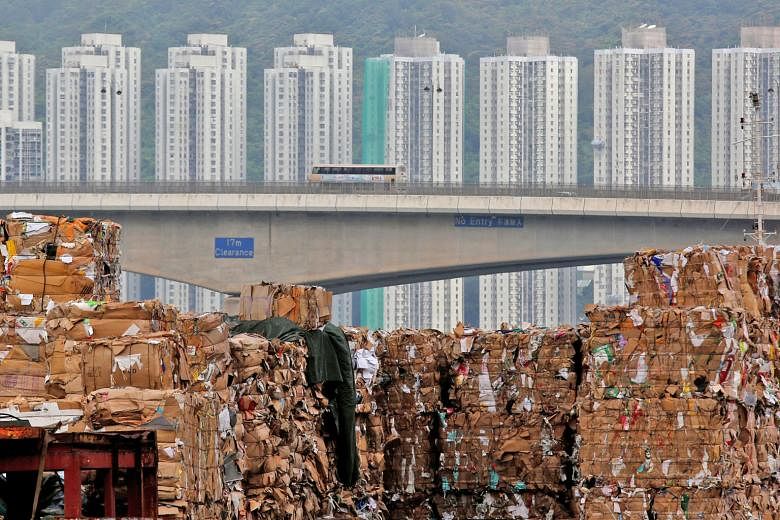HONG KONG • Hong Kong boasts glittering skyscrapers, seamless transportation and billion-dollar infrastructure projects, but it is struggling with a much more mundane problem: disposing of its rubbish.
The former British colony is grappling with a growing mountain of waste resulting from China's ban this year on imports of 24 types of unprocessed rubbish - part of an effort to upgrade its recycling industry and reduce pollution.
The Hong Kong government acknowledges its inability to cope with the problem, saying that it lacks the land to develop an effective recycling industry.
Critics say that the city has done too little to upgrade and develop its waste management system.
"Hong Kong is a rich city with third-world quality recycling," said Mr Douglas Woodring, founder and managing director of Ocean Recovery Alliance, a Hong Kong-based non-governmental organisation.
"It has been too easy to send unprocessed waste to China."
Until last year, Hong Kong exported over 90 per cent of its recyclables to China.
Now, huge mountains of old newspapers, cardboard and office scrap have piled up in Hong Kong's docks over the past few months, while plastic waste has been dumped into the landfills.
A city of more than seven million people, Hong Kong deposits around two-thirds of its waste into landfills - 5.6 million tonnes annually. Little is recycled.
Hong Kong's deputy director for environmental protection Vicki Kwok said that the densely populated city was unable to absorb all the recyclables due to a lack of available land in one of the world's most expensive property markets.
An average Hong Kong resident throws away around 1.4kg of waste daily, more than double that of Asian cities such as Tokyo, Seoul and Taipei, which have extensive recycling programmes.
Food waste, which accounts for the bulk of total waste generated, amounts to some 3,600 tonnes each day - the equivalent of 300 double-decker buses.
The government is aiming to open a facility this year that would convert food waste into energy and usable resources.
However, the total recycling capacity will be a maximum of 200 tonnes daily, while a second phase starting operations in 2021 will process a maximum of 300 tonnes per day.
Mrs Kwok also said the government was planning to expand three active landfills set to reach capacity, starting next year.
Hong Kong, which has already filled up 13 landfills, is planning to start charging consumers for what they throw out, but implementation is unlikely to take effect in the coming two years.
Mr Woodring said the government was too reliant on expanding landfills as a means of disposing of rubbish, rather than reallocating land for waste management.
"Hong Kong has the capability to build processing plants," he said, referring to recycling. "There is plenty of land. The land has just been misused and misallocated."
REUTERS

